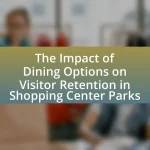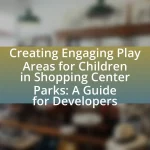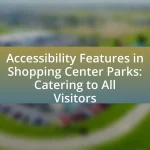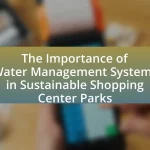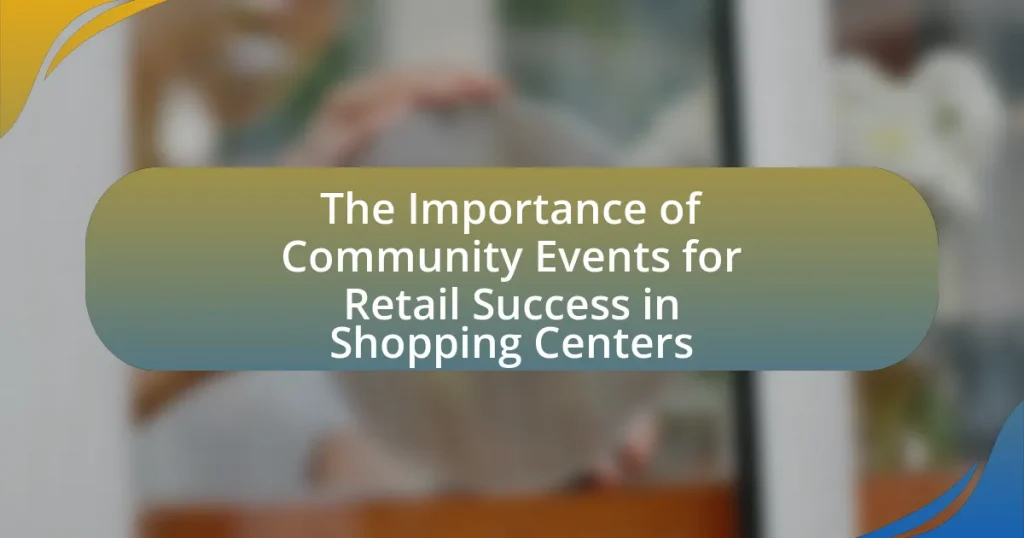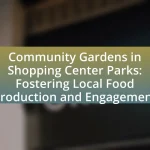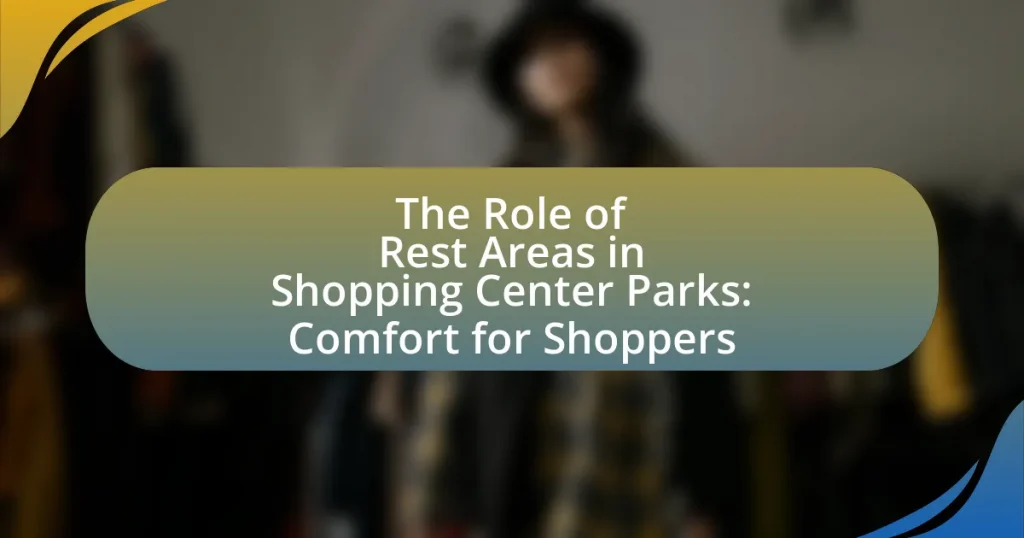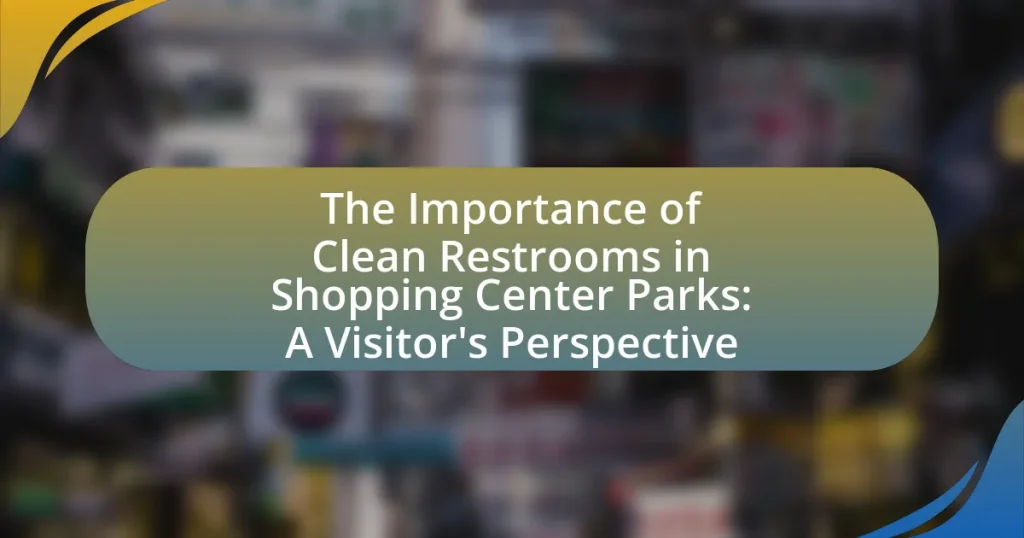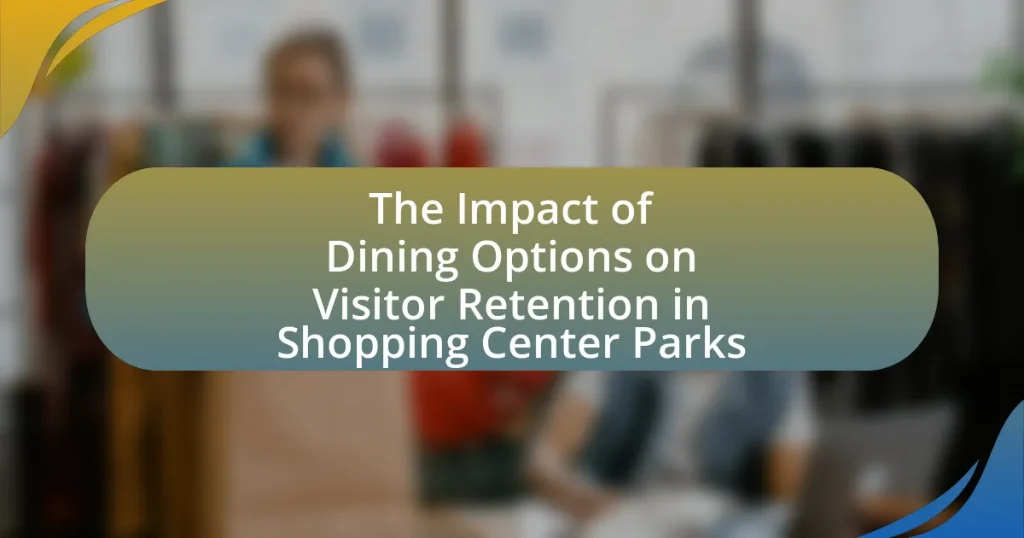Community events are organized activities within shopping centers that engage local residents and promote social interaction, playing a crucial role in retail success. These events drive foot traffic, enhance customer loyalty, and foster a sense of community, leading to increased sales. Research shows that shopping centers hosting regular community events experience a significant rise in customer visits, with effective types of events including farmers’ markets, seasonal festivals, and holiday celebrations. Additionally, community events strengthen relationships between retailers and customers, build brand loyalty, and contribute to a positive shopping atmosphere, ultimately benefiting both retailers and the community.
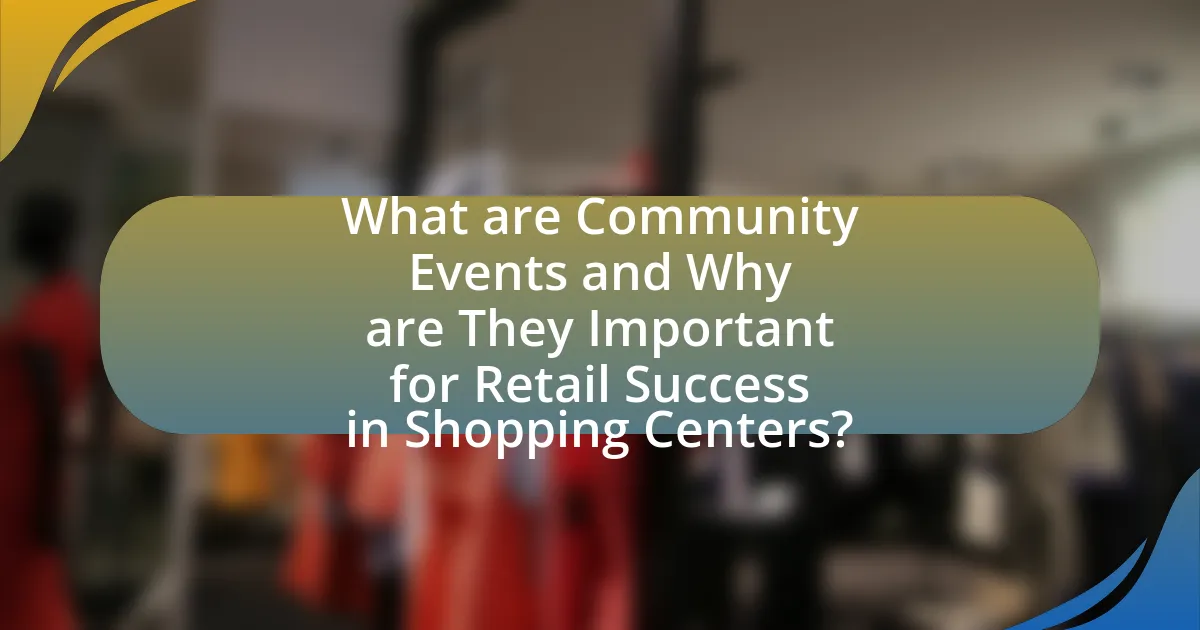
What are Community Events and Why are They Important for Retail Success in Shopping Centers?
Community events are organized activities that engage local residents and foster social interaction within a shopping center. These events are important for retail success because they drive foot traffic, enhance customer loyalty, and create a sense of community, which can lead to increased sales. Research indicates that shopping centers hosting regular community events see a 20% increase in customer visits compared to those that do not, demonstrating the direct correlation between community engagement and retail performance.
How do Community Events Influence Customer Engagement in Shopping Centers?
Community events significantly enhance customer engagement in shopping centers by creating a sense of belonging and fostering social interactions among visitors. These events attract diverse groups, encouraging foot traffic and increasing dwell time, which can lead to higher sales for retailers. For instance, a study by the International Council of Shopping Centers found that shopping centers hosting community events experienced a 20% increase in customer visits compared to those that did not. Additionally, events such as local markets, festivals, or charity drives provide opportunities for retailers to showcase their products and connect with customers on a personal level, further solidifying brand loyalty.
What types of Community Events are most effective in attracting shoppers?
Community events that are most effective in attracting shoppers include farmers’ markets, seasonal festivals, and holiday-themed events. Farmers’ markets draw local consumers seeking fresh produce and artisanal goods, fostering community engagement and increasing foot traffic. Seasonal festivals, such as summer fairs or autumn harvest celebrations, create a festive atmosphere that encourages families to visit shopping centers for entertainment and shopping. Holiday-themed events, like Christmas markets or Halloween celebrations, leverage the festive spirit to boost shopper turnout, as evidenced by a 2019 study from the International Council of Shopping Centers, which found that 70% of shoppers are more likely to visit a shopping center during holiday events. These types of events not only enhance the shopping experience but also strengthen community ties, making them effective strategies for attracting shoppers.
How do Community Events foster a sense of belonging among shoppers?
Community events foster a sense of belonging among shoppers by creating opportunities for social interaction and engagement within a shared space. These events encourage shoppers to connect with one another, fostering relationships that enhance their shopping experience. For instance, studies show that participation in community events can increase customer loyalty by up to 30%, as shoppers feel more integrated into the community. Additionally, events such as local markets or festivals provide a platform for local businesses to showcase their offerings, reinforcing a sense of community identity and pride. This collective experience not only strengthens social ties but also encourages repeat visits, ultimately benefiting the retail environment.
What Role do Community Events Play in Building Brand Loyalty?
Community events play a crucial role in building brand loyalty by fostering personal connections between consumers and brands. These events create opportunities for direct interaction, allowing customers to engage with the brand in a meaningful way, which enhances emotional attachment. Research indicates that 70% of consumers feel more connected to brands that participate in community events, as these experiences create a sense of belonging and community. Additionally, community events often encourage word-of-mouth marketing, as satisfied participants share their experiences with others, further solidifying brand loyalty.
How can Community Events enhance the relationship between retailers and customers?
Community events enhance the relationship between retailers and customers by fostering direct engagement and building trust. These events create opportunities for retailers to interact with customers in a relaxed environment, allowing for personal connections that strengthen brand loyalty. For instance, a study by the International Council of Shopping Centers found that 70% of consumers feel more connected to a retailer after participating in community events, highlighting the positive impact on customer relationships. Additionally, community events often encourage local participation, which can lead to increased foot traffic and sales for retailers, further solidifying their presence in the community.
What strategies can retailers use to leverage Community Events for brand loyalty?
Retailers can leverage community events to enhance brand loyalty by actively engaging with local customers through sponsorship, participation, and hosting events that resonate with the community’s interests. By sponsoring local festivals or charity events, retailers can increase visibility and demonstrate commitment to community values, which fosters emotional connections with consumers. Additionally, hosting in-store events, such as workshops or product demonstrations, allows retailers to create memorable experiences that encourage customer interaction and loyalty. Research indicates that 70% of consumers are more likely to support brands that are involved in their communities, highlighting the effectiveness of these strategies in building brand loyalty.
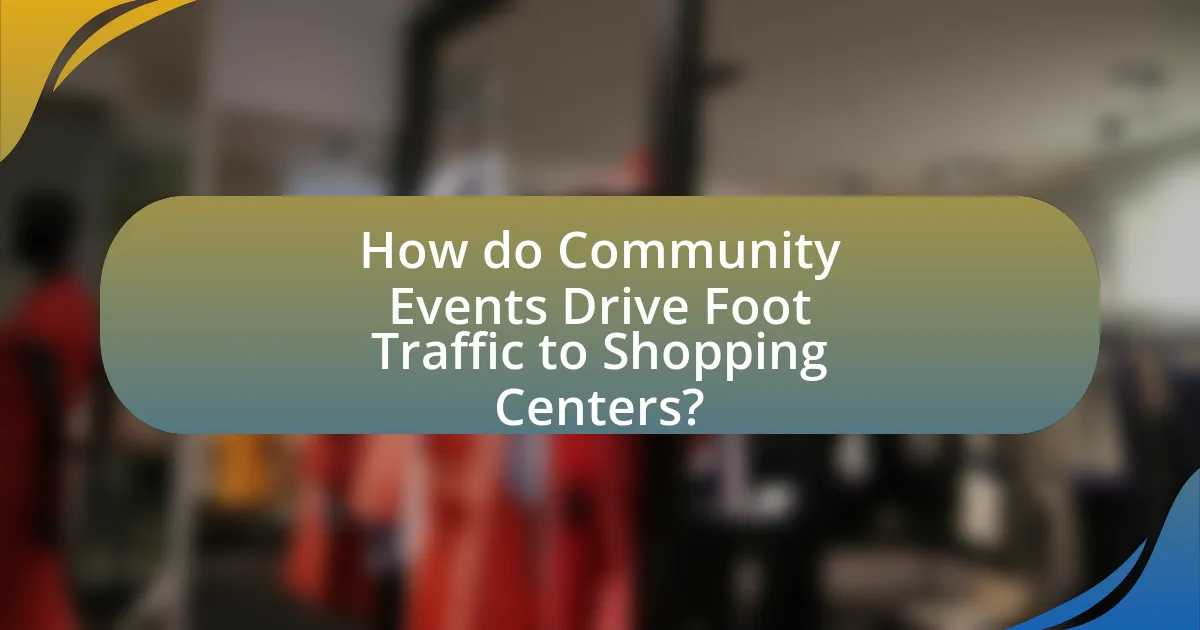
How do Community Events Drive Foot Traffic to Shopping Centers?
Community events drive foot traffic to shopping centers by creating engaging experiences that attract local residents. These events, such as festivals, markets, and holiday celebrations, encourage community participation and foster a sense of belonging, which increases the likelihood of visitors coming to the shopping center. For instance, a study by the International Council of Shopping Centers found that 70% of consumers are more likely to visit a shopping center that hosts community events. Additionally, these events often feature local vendors and entertainment, which not only enhances the shopping experience but also promotes local businesses, further drawing in crowds.
What are the key factors that make Community Events successful in increasing foot traffic?
Community events are successful in increasing foot traffic due to effective marketing, engaging activities, and strong community involvement. Effective marketing strategies, such as targeted social media campaigns and local partnerships, attract attention and encourage attendance. Engaging activities, like live performances, workshops, and contests, create a vibrant atmosphere that draws people in. Strong community involvement fosters a sense of ownership and pride, motivating residents to participate and invite others. According to a study by the International Council of Shopping Centers, 70% of shoppers are more likely to visit a shopping center that hosts community events, highlighting the direct correlation between these events and increased foot traffic.
How does the timing of Community Events affect shopper turnout?
The timing of Community Events significantly affects shopper turnout by aligning with consumer availability and preferences. Events scheduled during weekends or holidays typically attract higher attendance, as more individuals are free from work commitments. Research indicates that events held during peak shopping seasons, such as the holiday season, can increase foot traffic by up to 30%, as shoppers are more inclined to participate in community activities while shopping. Additionally, events that coincide with local festivals or school breaks tend to draw larger crowds, as families seek engaging activities. Therefore, strategic timing is crucial for maximizing shopper turnout at community events.
What promotional tactics can be used to maximize attendance at Community Events?
To maximize attendance at community events, effective promotional tactics include leveraging social media marketing, local partnerships, and targeted advertising. Social media platforms, such as Facebook and Instagram, allow event organizers to reach a broad audience quickly, with studies showing that 73% of marketers believe that their efforts through social media marketing have been “somewhat effective” or “very effective” for their business (Buffer, 2020). Collaborating with local businesses can enhance visibility and credibility, as joint promotions can tap into existing customer bases. Additionally, targeted advertising, such as geo-targeted ads, can ensure that promotional content reaches individuals in the vicinity of the event, increasing the likelihood of attendance. These tactics, when combined, create a comprehensive approach that effectively drives community engagement and participation.
How do Community Events Contribute to the Overall Atmosphere of Shopping Centers?
Community events significantly enhance the overall atmosphere of shopping centers by fostering a sense of belonging and engagement among shoppers. These events attract diverse crowds, encouraging social interaction and creating a vibrant environment that promotes foot traffic. For instance, a study by the International Council of Shopping Centers found that shopping centers hosting community events experienced a 20% increase in customer visits compared to those that did not. This increase in foot traffic not only boosts sales for retailers but also cultivates a lively atmosphere that encourages repeat visits.
What impact do Community Events have on the shopping experience?
Community events significantly enhance the shopping experience by fostering a sense of connection and engagement among shoppers. These events attract foot traffic, which increases sales for retailers; for instance, a study by the International Council of Shopping Centers found that 70% of shoppers are more likely to visit a shopping center hosting community events. Additionally, community events create a vibrant atmosphere that encourages social interaction, making shopping more enjoyable and memorable. This positive environment can lead to increased customer loyalty and repeat visits, as shoppers associate the shopping center with community involvement and positive experiences.
How can Community Events create a vibrant community culture within shopping centers?
Community events can create a vibrant community culture within shopping centers by fostering social interaction and engagement among local residents. These events, such as farmers’ markets, festivals, and workshops, encourage community members to gather, share experiences, and build relationships, which enhances the sense of belonging. Research indicates that shopping centers that host regular community events see increased foot traffic and customer loyalty, as these gatherings attract diverse groups and create a lively atmosphere. For instance, a study by the International Council of Shopping Centers found that 70% of consumers are more likely to visit a shopping center that hosts community events, demonstrating the direct correlation between such activities and enhanced community culture.
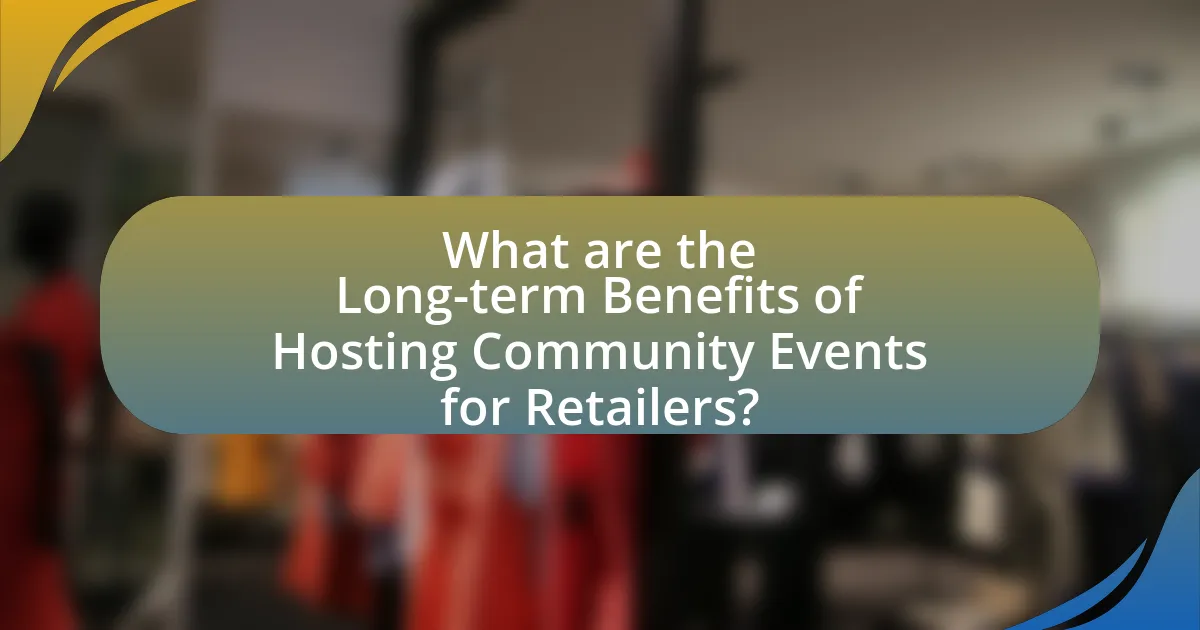
What are the Long-term Benefits of Hosting Community Events for Retailers?
Hosting community events provides retailers with long-term benefits such as increased customer loyalty, enhanced brand visibility, and stronger community relationships. These events create a platform for retailers to engage directly with their customers, fostering a sense of belonging and loyalty that can lead to repeat business. According to a study by the National Retail Federation, 70% of consumers are more likely to support businesses that actively engage in their local community. Additionally, community events can significantly boost brand awareness, as they often attract media coverage and social media attention, further amplifying the retailer’s reach. By building strong relationships within the community, retailers can also benefit from word-of-mouth marketing, which is a powerful tool for attracting new customers.
How can Community Events lead to increased sales for retailers?
Community events can lead to increased sales for retailers by driving foot traffic and enhancing customer engagement. When retailers participate in community events, they attract local residents who may not have visited their stores otherwise, resulting in higher in-store visits. For example, a study by the International Council of Shopping Centers found that 70% of shoppers are more likely to visit a shopping center that hosts community events. Additionally, these events create opportunities for retailers to showcase their products, build brand loyalty, and foster relationships with customers, which can translate into repeat business and increased sales.
What metrics should retailers track to measure the success of Community Events?
Retailers should track attendance, engagement, sales impact, and customer feedback to measure the success of community events. Attendance metrics quantify the number of participants, indicating the event’s reach and interest level. Engagement metrics, such as social media interactions and participation in activities, reflect how actively attendees are involved. Sales impact can be assessed by comparing sales data before, during, and after the event, providing insight into the event’s effect on revenue. Customer feedback, gathered through surveys or direct comments, offers qualitative data on attendee satisfaction and areas for improvement. These metrics collectively provide a comprehensive view of an event’s effectiveness in driving community involvement and business outcomes.
How do Community Events help in building a positive reputation for shopping centers?
Community events significantly enhance the positive reputation of shopping centers by fostering community engagement and creating memorable experiences. These events attract local residents, encouraging them to visit the shopping center, which increases foot traffic and sales for retailers. For instance, a study by the International Council of Shopping Centers found that 70% of consumers are more likely to visit a shopping center that hosts community events, indicating a direct correlation between such events and increased patronage. Additionally, community events promote a sense of belonging and loyalty among shoppers, as they associate the shopping center with positive social interactions and community support. This connection not only enhances customer retention but also encourages word-of-mouth marketing, further solidifying the shopping center’s reputation as a community hub.
What Best Practices Should Retailers Follow When Organizing Community Events?
Retailers should prioritize community engagement, effective planning, and clear communication when organizing community events. Engaging the community fosters relationships and builds brand loyalty, which is essential for retail success. Effective planning involves setting clear objectives, selecting appropriate venues, and scheduling events at times that maximize attendance. Clear communication ensures that the target audience is informed about the event details through various channels, such as social media, email newsletters, and local advertising. According to a study by the International Council of Shopping Centers, 70% of shoppers are more likely to visit a shopping center that hosts community events, highlighting the importance of these best practices in driving foot traffic and enhancing customer relationships.
How can retailers effectively collaborate with local organizations for Community Events?
Retailers can effectively collaborate with local organizations for community events by establishing clear communication channels and aligning their goals with those of the organizations. This collaboration can involve co-hosting events, sharing resources, and promoting each other’s initiatives to enhance community engagement. For instance, a study by the International Council of Shopping Centers found that shopping centers that partner with local nonprofits see a 20% increase in foot traffic during community events, demonstrating the tangible benefits of such collaborations. By leveraging local organizations’ networks and expertise, retailers can create more impactful events that resonate with the community, ultimately driving sales and fostering customer loyalty.
What are the common pitfalls to avoid when planning Community Events?
Common pitfalls to avoid when planning community events include inadequate planning, poor communication, and neglecting audience engagement. Inadequate planning often leads to logistical issues, such as insufficient resources or conflicting schedules, which can disrupt the event’s success. Poor communication among team members and with the community can result in misunderstandings and low participation rates. Neglecting audience engagement, such as failing to tailor activities to the interests of the community, can diminish the event’s appeal and effectiveness. These pitfalls can significantly hinder the overall impact of community events, which are crucial for fostering relationships and driving retail success in shopping centers.


